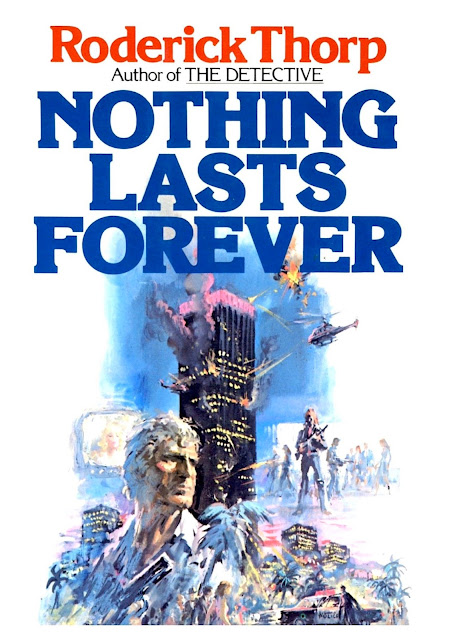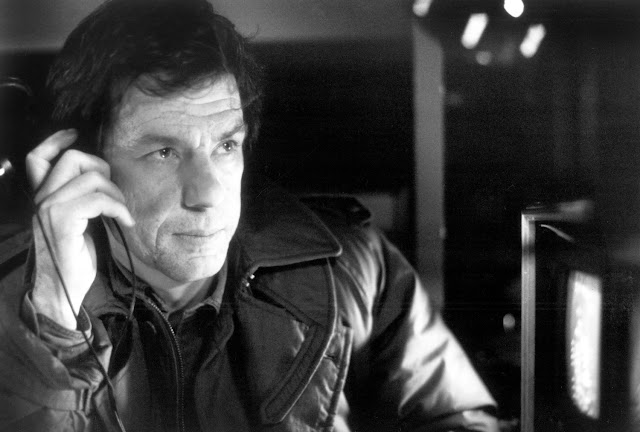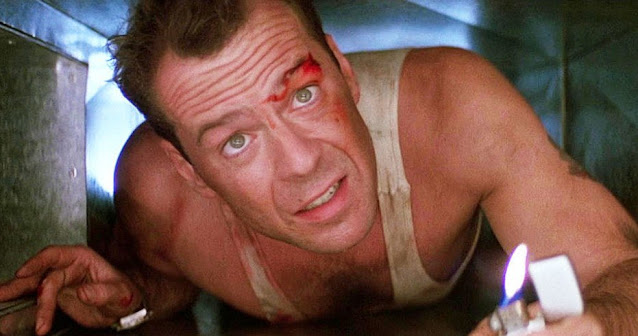Transforming the "Die Hard" Script from Grim to “Joyful”
If not for director John McTiernan, Die Hard might have reached the screen as a grim vigilante movie about a bloody terrorist incident. The source novel, Roderick Thorp’s Nothing Lasts Forever, was much darker and ends badly. As Thorp described the plot, “The cop goes berserk – he’s on a killing rampage, and he doesn’t want it to end. That didn’t make it into the movie.”
 |
| The original cover art for Die Hard's source novel |
As John McTiernan recalled, “I’d just finished Predator, and the studio had seen it and liked it, so they started giving me scripts, and Die Hard was one of them. I turned it down a number of times, because the original script was really a terrorist incident. It had very little humor and seemed to take itself very seriously. It seemed to me that terrorism wasn’t entertaining… I didn’t say ‘yes’ to this project until we figured out ways to put, in essence, some ‘joy’ in it. How do you take the meanness out of a terrorist story and turn it into something that is essentially summer entertainment?”
So McTiernan sat down with screenwriter Steven De Souza to see if the Die Hard script was salvageable. De Souza said, “John began as a writer, and therefore you could have a conversation about structure and dialogue that was very concrete, where sometimes, when you have talented directors who are essentially shooters, the conversation can be very fuzzy – ‘We need a feeling of dread,’ or ‘I see ominous.’ One of the first big changes was, ‘Hey, what if they’re not really terrorists?’ So I made the legitimate demands of the terrorists in the book into a cover story. This solved one of the big problems of the screenplay, which was that so much time passes and so little happens.”
 |
| Director John McTiernan on the set of Die Hard |
With that change, John McTiernan began to see the light at the end of the tunnel. “Eventually, we found a way to think of it as something other than a terrorist incident,” he said. “I had this notion – although I didn't really tell the studio this – that you could turn it into a sort of Shakespearean comedy, that it would become a panorama of the people involved in the incident. I basically structured it as a comedy. It was actually A Midsummer Night’s Dream. That is, something happens on a festival night that turns the world upside-down, and all the princes become asses and all the asses become princes. In the morning the true lovers are reunited and everyone goes on, but the world is better than it was the night before.”
“So I started making changes in the script along those lines,” said McTiernan. “I just tried to find ways to expand the comedy and involve other characters. I guess the major change we made was turning it into a robbery, and that was when I said, ‘Yes, I’ll do it.’ As I said, I’ve never found terrorism entertaining, but a good robbery is fun. Whether it be about the bad guys or the good guys, people love to watch a good caper. I thought, ‘If I could put that in the center of it, then it would take away the meanness.’ So many action movies are mean at their heart. I personally find them uninteresting and unentertaining. They’re just no fun.”
Despite the demonstrable success of the changes he made to Die Hard, John McTiernan could still admit that his solution wasn’t perfect. “A lot of people have commented – and they’re completely right – that the plot in this is ludicrous, that terrorists pretending to be terrorists so they can be robbers is ridiculous. But it allowed me to get to the essential thing that I was talking about earlier, that we can enjoy an intention of the bad guys – to cleverly snatch a whole pile of money. You couldn’t enjoy it if he was trying to get the money because of some political thing. The sense of joy would go out of the movie at that instant, and it doesn’t matter how many times they hummed ‘The Ode to Joy,’ the joy would be gone.”
Robert Emery, The Directors: Take Two, 2002
Die Hard DVD: Commentary
Sean O’Neill, “Heart of Darkness,” LA View, 10/13/95



Comments